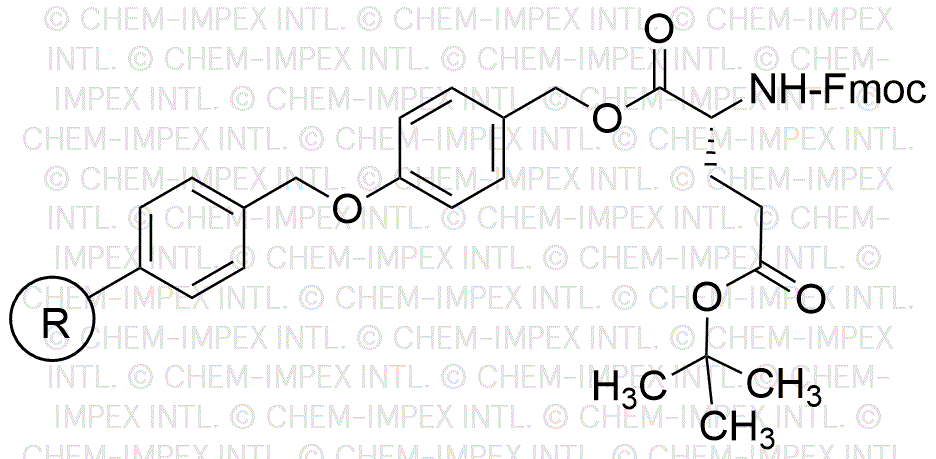Fmoc-g-tert-butyl ester-D-glutamic acid-4-alkoxybenzyl alcohol resin is widely utilized in research focused on:
- Peptide Synthesis: This compound serves as a key building block in solid-phase peptide synthesis, allowing researchers to create complex peptides efficiently.
- Drug Development: It plays a crucial role in the development of peptide-based therapeutics, providing a versatile platform for modifying drug properties.
- Bioconjugation: The resin can be used to attach peptides to various biomolecules, facilitating the creation of targeted drug delivery systems.
- Material Science: It is employed in the synthesis of functionalized polymers, which can be used in coatings and advanced materials with specific properties.
- Research in Neuroscience: This compound aids in the study of neurotransmitter systems by allowing the synthesis of glutamate analogs for receptor studies.
Informations générales
Propriétés
Sécurité et réglementation
Applications
Fmoc-g-tert-butyl ester-D-glutamic acid-4-alkoxybenzyl alcohol resin is widely utilized in research focused on:
- Peptide Synthesis: This compound serves as a key building block in solid-phase peptide synthesis, allowing researchers to create complex peptides efficiently.
- Drug Development: It plays a crucial role in the development of peptide-based therapeutics, providing a versatile platform for modifying drug properties.
- Bioconjugation: The resin can be used to attach peptides to various biomolecules, facilitating the creation of targeted drug delivery systems.
- Material Science: It is employed in the synthesis of functionalized polymers, which can be used in coatings and advanced materials with specific properties.
- Research in Neuroscience: This compound aids in the study of neurotransmitter systems by allowing the synthesis of glutamate analogs for receptor studies.
Documents
Fiches de données de sécurité (FDS)
La FDS fournit des informations de sécurité complètes sur la manipulation, le stockage et l’élimination du produit.
Spécifications du produit (PS)
Le PS fournit une description complète des propriétés du produit, notamment sa composition chimique, son état physique, sa pureté et les exigences de stockage. Il détaille également les plages de qualité acceptables et les applications prévues du produit.
Certificats d'analyse (COA)
Recherchez des certificats d'analyse (COA) en saisissant le numéro de lot du produit. Les numéros de lot et de lot se trouvent sur l'étiquette d'un produit, après les mots « Lot » ou « Lot de fabrication ».
Numéro de catalogue
Numéro de lot/série
Certificats d'origine (COO)
Ce certificat d'exploitation confirme le pays dans lequel le produit a été fabriqué, et détaille également les matériaux et composants utilisés et s'il est issu de sources naturelles, synthétiques ou autres sources spécifiques. Ce certificat peut être requis pour les douanes, le commerce et la conformité réglementaire.
Numéro de catalogue
Numéro de lot/série
Fiches de données de sécurité (FDS)
La FDS fournit des informations de sécurité complètes sur la manipulation, le stockage et l’élimination du produit.
DownloadSpécifications du produit (PS)
Le PS fournit une description complète des propriétés du produit, notamment sa composition chimique, son état physique, sa pureté et les exigences de stockage. Il détaille également les plages de qualité acceptables et les applications prévues du produit.
DownloadCertificats d'analyse (COA)
Recherchez des certificats d'analyse (COA) en saisissant le numéro de lot du produit. Les numéros de lot et de lot se trouvent sur l'étiquette d'un produit, après les mots « Lot » ou « Lot de fabrication ».
Numéro de catalogue
Numéro de lot/série
Certificats d'origine (COO)
Ce certificat d'exploitation confirme le pays dans lequel le produit a été fabriqué, et détaille également les matériaux et composants utilisés et s'il est issu de sources naturelles, synthétiques ou autres sources spécifiques. Ce certificat peut être requis pour les douanes, le commerce et la conformité réglementaire.


